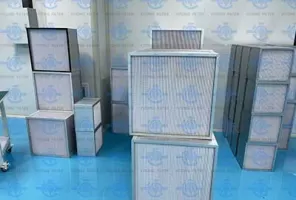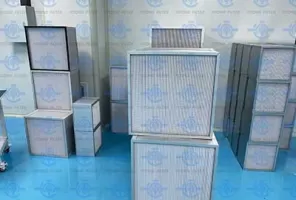 August 17, 2023
August 17, 2023
Air filters are common devices often used in cleanrooms and ventilation and air conditioning systems. Their primary function is to remove impurities and harmful substances from the air, ensuring that the indoor air supplied is clean and safe. Understanding the basic requirements of air filters is crucial for making the right selection and using them effectively. This article will introduce the 5 fundamental requirements of air filters. Join me to learn more!

1. Efficiency: The foremost requirement for an air filter is high filtration efficiency. It should effectively remove various pollutants from the air, such as dust, particles, bacteria, fungi, and viruses, ensuring that the air quality indoors meets standard requirements. Therefore, when selecting an air filter, its filtration performance and operational efficiency should be considered to achieve the desired level of air cleanliness.
2. Durability: Air filters undergo prolonged exposure to high-speed airflow and particle impact during operation. Hence, durability is a critical requirement for air filters. They should possess a robust structure and materials to withstand extended usage while maintaining a longer lifespan.
3. Low Resistance: While filtering air, air filters also create resistance to airflow. Therefore, the resistance of an air filter should be kept as low as possible to ensure smooth air circulation. Opting for low-resistance air filters not only enhances the energy efficiency of the system but also extends the equipment's operational life.
4. Easy Installation and Maintenance: The installation and maintenance of air filters should be convenient and swift. They should integrate seamlessly with other components of the system, ensuring airtightness and stability during installation. Simultaneously, the replacement and cleaning of air filters should be simple and straightforward, reducing maintenance costs and workload for staff.
5. Environmental Friendliness: The production and use of air filters should align with environmental protection requirements. Filtration materials and processes that meet environmental standards should be chosen, minimizing environmental pollution. Additionally, the disposal of waste from air filters should adhere to relevant regulations to avoid secondary pollution of the environment.
By understanding these fundamental requirements, we can better select and use air filters, ensuring that indoor air quality meets standard requirements. Opting for efficient, durable, low-resistance, easily installable and maintainable, and environmentally friendly air filters will contribute to improving the comfort and healthiness of living and working environments. We hope this article has been helpful to you!
For more knowledge about air filters and air purification, please stay tuned for our upcoming articles. Thank you for reading!
 Oct. 11, 2024
Understanding Terminal HEPA Filters: The Key to Clean Air
Oct. 11, 2024
Understanding Terminal HEPA Filters: The Key to Clean Air
 Oct. 09, 2023
H10 V-Bank HEPA Filter
Oct. 09, 2023
H10 V-Bank HEPA Filter
 Sep. 10, 2024
Understanding the Absolute Filter H14: Features, Benefits, and Applications
Sep. 10, 2024
Understanding the Absolute Filter H14: Features, Benefits, and Applications

